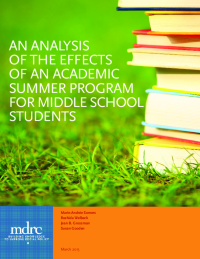An Analysis of the Effects of an Academic Summer Program for Middle School Students
This report examines the implementation and effects of the academic summer program for middle school students offered by Building Educated Leaders for Life (BELL). BELL’s middle school program serves rising sixth- through eighth-grade students who are performing one to two years below grade level. The goals of the program are to increase students’ literacy and math skills and to enhance their social development. To achieve these goals, BELL provides students with 6.5 hours of daily programming for approximately five weeks, five days per week. Several types of activities are provided: academic instruction in math and English Language Arts; social and academic enrichment activities; and field trips, guest speakers, and community service. BELL’s contributions to summer learning began with its now well-established program for elementary school students. More recently, growing demand for programs serving older students has led BELL to expand into middle school.
In this study, which is funded by the Edna McConnell Clark Foundation’s Social Innovation Fund, the impact of BELL’s middle school program was evaluated using a random assignment research design — a lottery-like process used to assign eligible students either to a program group that was invited to participate in the BELL program or to a control group that was not. The study was conducted in summer 2012 in three school districts that were new partnerships for BELL. Due to various challenges related to student recruitment, the study’s sample size is smaller than planned, and the margin of error around the impact findings is quite large. Even so, the results in this report can still be useful for generating suggestive or preliminary evidence about the potential effects of a full-day, academically oriented summer program model for middle school students.
Overall, the findings from this study indicate that BELL mounted a fairly well-run and well-staffed five-week summer program in summer 2012 and that students attended at a high rate even though the program was voluntary. The pattern of impact estimates suggests that, on returning to school in fall 2012, BELL students may have had stronger math skills than they would have had otherwise — equivalent to a little over one month of learning, which is the effect that one would expect from a five-week program during the regular school year. Though the magnitude of this effect is not statistically significant, it is similar in size to what has been found in prior evaluations of voluntary summer programs at the elementary school level. On assessments of reading skills, however, there is no indication that the BELL students outscored their counterparts in the non-BELL group.
Taken together, the findings provide suggestive preliminary evidence that voluntary academic summer programs can have positive effects on middle school students’ math achievement but that improving their reading achievement is a more challenging task because it is harder to keep students in this age group engaged. While additional research would be required to confirm these preliminary findings, if true, this suggests that strategies for teaching reading skills to middle school students may need to be different than the approaches used with elementary school students.






